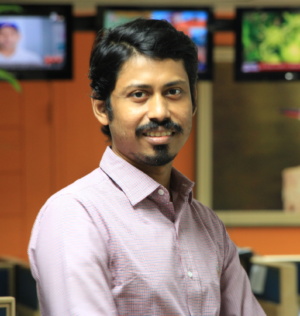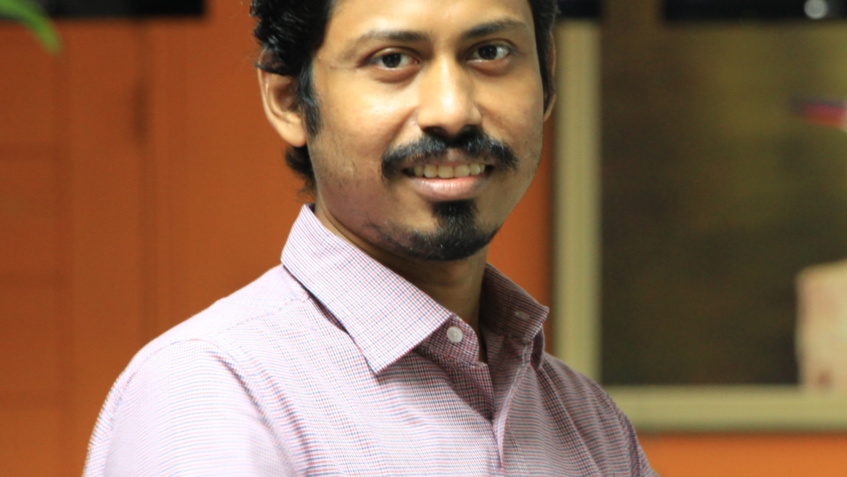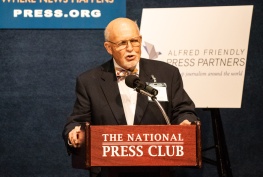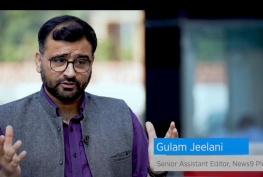
Back in Bangladesh With Big Ambitions (Updated 1/5)
New alum writes handbook, launches news lab to counter misinformation
(This article was updated January 5)
By Saurav Rahman
“The end of one journey is the beginning of another. ” That’s the title of my takeaway presentation on the very last day of our three-month-long fellowship program with Alfred Friendly Press Partners.
Those words told to fellowship classmates in Washington’s National Press Building this year turned out to be true regarding my work back home in Bangladesh.
Since returning to my newsroom in Maasranga Television, I can really feel the changes in my storytelling— a skill I honed at Kansas City Public Broadcasting Service and Flatland, the PBS station’s digital news outlet.
As a financial journalist, I need to deal with lots of numbers in my reports; however, now it is the real people who drive my stories and explain life beyond the numbers. Now I try to get my audience to think about the issue and its impact on people through my writing.
I believe these are the key changes in my journalism after the fellowship and I am very glad to let you know that I circulate the knowledge to my colleagues in the newsroom as well.
Another big takeaway is data journalism skills. After more than a decade of reporting on financial issues, I was very comfortable with numbers and data. However, my knowledge was limited to the functions of a spreadsheet.
The fellowship introduced me to high-level data journalism and allowed me to participate in workshops at the annual conference organized by Investigative Reporters and Editors (IRE).
And honestly, master classes and hands-on training shape me more to deal with data nowadays. Because of that knowledge, I got a chance to write a guidebook on the Basics of Data Journalism, along with a veteran journalist and editor in Bangladesh.
This is the first data journalism guidebook in our native language. The aim of the publication is to create interest in data-driven projects among local journalists.
Trainers from Alfred Friendly and the Organized Crime and Corruption Reporting Project (OCCRP) helped us in various ways to start our venture. I benefited most from learning technical steps to develop a project —writing a proposal, creating a budget, and pitching the proposal to potential donors.
Classes by Alfred Friendly President Randy Smith at the Missouri School of Journalism taught us how a journalism project could be commercially successful; hearing the experiences of other Fellows helped as well.
A project to elevate truth and critical thinking
At the end of December, we launched a unique digital media outlet — Dismislab.com. The misinformation and disinformation lab is a project of Digitally Right, an organization that supports independent media in Bangladesh. We launched the website in Bengali and soon will add an English version.
Our new project is an independent, impartial, and non-political online verification and media research platform.
This is not a news medium and not merely a fact-checking website.
It is a journey begun as an information laboratory that would monitor contemporary information flows, conduct research, verify information, and above all work to enhance the critical thinking of journalists and the citizens of the country. Our work is research-based.
We work in four different but integrated areas— FactCheck, Media Literacy, Media Watchdog, and Research.
We do fact-check but don’t limit ourselves to just fact-checking.
Our Media Literacy section tries to raise awareness, rather than simply telling them what to do.
Our Media Watchdog not only seeks to hold the media accountable but also to enhance their ability to check against the tide of disinformation. The Research section will reveal not only our own research but also research from outside our country that’s relevant to Bangladesh.
We have four key objectives for our initiatives:
- build and promote media literacy at all levels through research work;
- present verified, correct and objective information after identifying online disinformation;
- help the media avoid the trap of false and harmful information and report correct information;
- analyze existing data online and find ways to make the data easy for people to understand.
Why is this needed now?
Bangladesh’s economy has been growing at a steady 6 percent rate for the past two decades. Access to the internet and social media usage is also growing very rapidly. Bangladesh has an internet penetration rate of 31.5 percent of the population and its capital Dhaka was ranked second in terms of having the most active Facebook users in the world, according to Data Reportal.
However, a recent study says 76 percent of its population has a low news literacy rate, which makes Bangladesh a fertile ground for disinformation. And that situation became more fragile due to a declining democracy, an extremely polarized society, growing religious intolerance in society, and a high level of self-censorship in mainstream media.
As a consequence of these dynamics, our country has been witnessing huge rumors about various issues from politics to health or even people’s personal lives.
What do we hope to achieve?
We aim to inform people as accurately as possible and help them make correct decisions by identifying misinformation and disinformation spread online. Minimizing the negative impact on people due to misinformation found online and creating awareness about such misinformation and propaganda is the heart of our work.
We want to empower people with facts by fighting the fake with evidence-based research and investigation. Our mission is to educate the audience and media with information literacy knowledge and verification skills. We believe if we can do that, people can easily fight back against misinformation.
The same goes with journalists and mainstream media, they can revive credibility, which they lose sometimes due to inappropriate fact-checking.
About the Author – Saurav Rahman

Saurav Rahman
Rahman, 33, has worked in journalism for 11 years and is a senior reporter for Maasranga Television. He focuses on the economy, business, and trade. During the fellowship program, Rahman worked at KCPT, the Public Broadcasting Service station in Kansas City, and with the KC Media Collective.
A story he reported for OCCRP as a freelancer revealed fraudulent activity of shadow banks and identified regulatory loopholes and shortcomings that left the global financial system vulnerable to fraud, money laundering, and corruption.
His reporting illuminated how climate change and poverty lead to illegal child marriages in marginal and disaster-affected parts of the country. His stories on garment factories exposed dangerous working conditions. An OCCRP project he contributed to provides insight into London’s company services industry, which UK law enforcement officials admit is regularly exploited by criminals.






